Home » Articles posted by Steffen Scholpp
Author Archives: Steffen Scholpp
BBQ party 2019
To celebrate a successful 2019! Well done, guys!
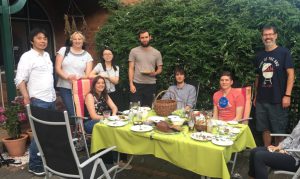
And happy birthday to Dan.
The new lab t-shirts are splendid.
Sally and Dan put great effort into designing the new lab t-shirts!
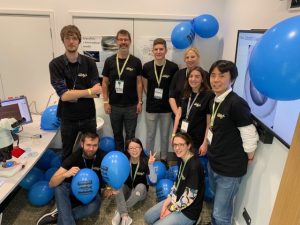
LSI OpenNight – A great success!
We told the open public about the importance of zebrafish research. All of our visitors were really impressed.
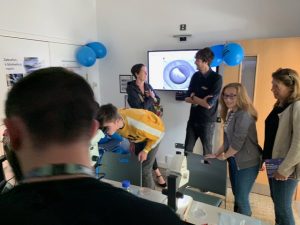
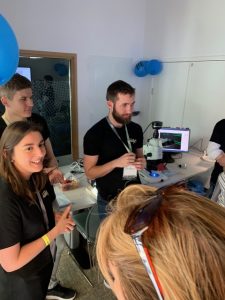
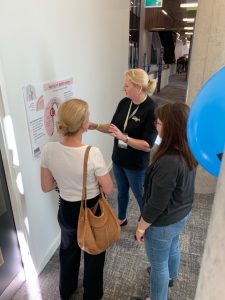
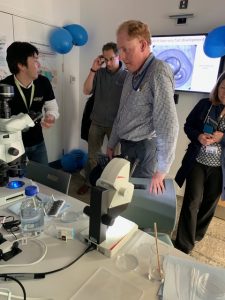
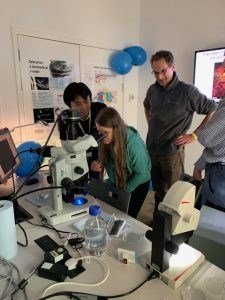
All the best, Jenna!
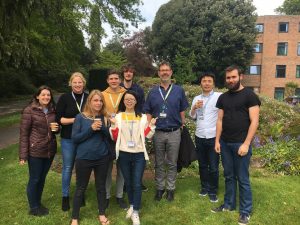 Great lunch to wish a farewell to Jenna. It was great to have you in the lab. Wish you all the best for your future endeavours. Best of luck.
Great lunch to wish a farewell to Jenna. It was great to have you in the lab. Wish you all the best for your future endeavours. Best of luck.
Welcome Sally!
S ally Rogers has joined the lab in March 2019 as a postdoctoral research fellow. She will investigate Wnt trafficking in gastric cancers. Welcome to the team!
ally Rogers has joined the lab in March 2019 as a postdoctoral research fellow. She will investigate Wnt trafficking in gastric cancers. Welcome to the team!
MRC funds research project on deciphering Wnt cytonemes in gastric cancer
 There is an urgent need to understand the cellular signalling network because it is fundamental to the maintenance of a stable state of mature tissue. Deregulation of this network leads to devastating diseases such as the initiation and growth of tumours. The Wnt signalling pathway contributes to this important signalling network and aberrant activation of Wnt signalling is a major driver of gastric cancer growth and metastasis.
There is an urgent need to understand the cellular signalling network because it is fundamental to the maintenance of a stable state of mature tissue. Deregulation of this network leads to devastating diseases such as the initiation and growth of tumours. The Wnt signalling pathway contributes to this important signalling network and aberrant activation of Wnt signalling is a major driver of gastric cancer growth and metastasis.
Despite three decades of Wnt research, we are still not able to explain how Wnt ligands are disseminated in a tissue, which is a prerequisite to control the Wnt network effectively during disease. Recently, our work has revealed the existence of an unexpected transport mechanism for Wnt proteins, which changes the way we understand how ligands spread in tissues: Wnt is rapidly loaded on thin cellular extensions to be transferred to target cells for signal activation. However, the mechanism controlling Wnt signalling protrusions is currently unknown. By closing this gap in our understanding of Wnt transport, we will enable the development of novel approaches to control Wnt signalling in malignancies like gastric cancer.
This project will provide new understandings of extracellular Wnt protein trafficking at the molecular, cellular and tissue level. Our hypothesis, supported by preliminary data, is that activating the Wnt pathway in the Wnt-producing cells reinforces formation of signal protrusions and thus Wnt signal activation in the neighbouring tissue. This will enable us to understand how Wnt signalling spreads through the tissue to induce proliferation in GC. To test our hypothesis, we will analyse the mechanism of Wnt trafficking and analyse the effect of drugs that limit Wnt signalling protrusions to control tumour growth.
The results of this multiscale, multidisciplinary project will provide a step change in understanding how the Wnt signalling pathway operates in gastric cancer. We are grateful that the Medical Research Council (MRC) recognizes the importance of Wnt trafficking in cancer development and will fund this project in the next three years.
Yosuke is analysing slow-muscle development.
 How do slow muscles develop? Yosuke Ono is a postdoc in Phil Inghams lab. He analyses the function of myosin light chain proteins in muscle development in zebrafish embryos. Welcome to your host lab.
How do slow muscles develop? Yosuke Ono is a postdoc in Phil Inghams lab. He analyses the function of myosin light chain proteins in muscle development in zebrafish embryos. Welcome to your host lab.
Cytonemes or TNTs?
Read in this article about the differences and common features of tunnelling nanotubes and cytonemes. Published in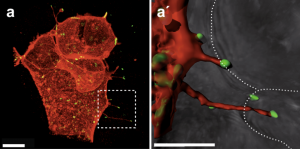 Histochemistry and Cell Biology
Histochemistry and Cell Biology
Welcome Dan!
 Dan has joined the lab as an MRC DTP funded PhD student in Oct 2018. He will investigate Wnt trafficking on exovesicles and cytonemes in 2D and 3D.
Dan has joined the lab as an MRC DTP funded PhD student in Oct 2018. He will investigate Wnt trafficking on exovesicles and cytonemes in 2D and 3D.
Welcome Chengting!
 Using fluorescence correlation spectroscopy, Chengting is going to decipher binding affinities of Wnts and Frizzled in the living zebrafish embryo in her CSC funded PhD project! Welcome to the team
Using fluorescence correlation spectroscopy, Chengting is going to decipher binding affinities of Wnts and Frizzled in the living zebrafish embryo in her CSC funded PhD project! Welcome to the team


